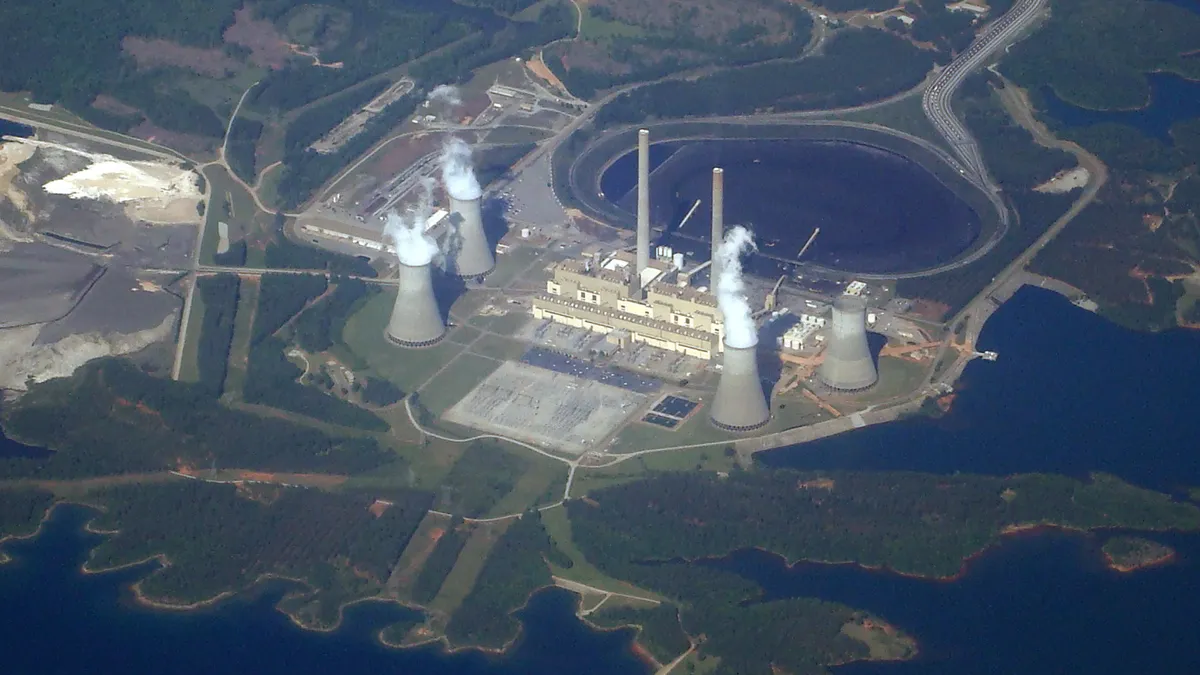Dive Brief:
- Plant Scherer in Georgia — for years, the highest capacity coal-fired plant in the U.S. — will lose one of its four units to retirement, a sign that even the largest coal power plants are not immune to the economic pressures driving down coal's standing in the U.S. generation mix.
- On Friday the board of directors of Jacksonville municipal utility JEA, a minority owner of the 848-MW unit 4 at Scherer, agreed to a 20-year purchase agreement with Florida Power & Light, the majority owner of the unit, that will replace the capacity the municipal utility receives from unit 4 and lead to its closure on Jan. 1, 2022.
- While the other three units at the plant are not affected by the decision, the closure of unit 4 will reduce the capacity of Scherer to 2,673 MW, making Southern Co.'s over 3,000-MW Plant Bowen, also in Georgia, now the largest coal-fired plant in the country, according to a statement from the Sierra Club.
Dive Insight:
Falling costs of competitive energy sources like renewables and natural gas, combined with new emissions regulations, have caused coal-fired generation to fall from producing 44% of U.S. electricity in 2009 to about 23% in 2019, according to U.S. Energy Information Administration data. Smaller coal-fired plants, many of which were built in the 1950s and 1960s and have less operating capacity over which to spread the costs of new emissions controls, have been more likely to retire than newer, larger coal plants, as observed by the Lawrence Berkeley National Laboratory and others.
But Scherer unit 4's impending retirement "is a clarion call that even the nation's biggest coal plants don't make economic sense," Stephen Stetson, a senior representative for the Sierra Club's Beyond Coal campaign, said in a statement. Scherer, in addition to being one of the largest coal-fired plants ever built in the U.S., came online in 1982.
Groups like the Sierra Club have been emphasizing that existing coal plants are uneconomic compared to wind and solar alternatives. Closing the unit will "lower operating costs" and provide "a pathway to significant expansion of solar energy in the near future," according to JEA.
The Sierra Club is continuing a campaign to close the rest of the Scherer plant. The group is currently waiting on a Georgia court to take up its appeal of state regulators' decision to allow Southern Co. subsidiary Georgia Power Co. to recover costs from ratepayers related to coal ash clean-up.
"That case has the potential to implicate Scherer and all of Georgia Power's coal plants," Stetson told Utility Dive.
The other three units are owned by Georgia Power, Oglethorpe Power, the Municipal Electric Authority of Georgia and the city of Dalton, Georgia. Southern Co. recently announced a commitment to net-zero carbon emissions by 2050, a goal that could entail the retirement of Bowen and other coal plants in the near future.
"We have been under the impression that, due to economics, Plants Wansley and Bowen would be likely next to close, with Scherer hanging out as Georgia's last coal plant," Stetson said. Wansley is another large, primarily coal-fired plant in Georgia.
At the same time, the coal industry portrays the retirement of major plants as a sign that policymakers should help coal-fired power stay online.
"Coal-fueled power plants are one of the nation's most-fuel secure sources of electricity, which means they are more reliable and resilient than almost any other source of electricity," according to Michelle Bloodworth, president and CEO of America's Power, a coal industry advocacy group. "The retirement of Unit 4 at Plant Scherer is part of an unfortunate trend that is leaving the electricity grid less fuel secure even though many policymakers are expressing concerns about the loss of fuel-security," she said in an email to Utility Dive.
America's Power views "fuel security" as an issue of whether or not the grid can tap other sources of energy in times of serious disruption, such as an attack on a natural gas pipeline. America's Power and other coal advocacy groups like the National Mining Association (NMA) argue that coal is a unique source of reliable electricity, especially in times of crisis.
"Anyone who values reliable electricity should be concerned about the accelerated retirements we're seeing," NMA spokeswoman Ashley Burke told Utility Dive.
The renewable energy industry, however, argues that there has been no evidence of weakening reliability, even as the amount of renewable energy on the grid has skyrocketed over the past several years. In addition, a 2019 report from the Congressional Research Service, responding to concerns from members of Congress about grid reliability, found that from 2013 to 2017 as renewable energy's presence on the grid was dramatically increasing, reliability was "generally stable or improving."
"In other words, generation from wind and solar sources does not appear to be causing electric reliability issues at the national level over this period," the report said.













